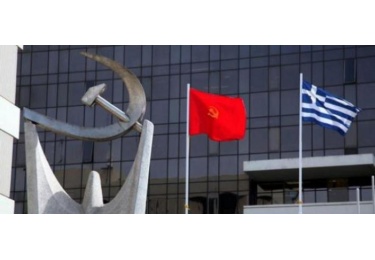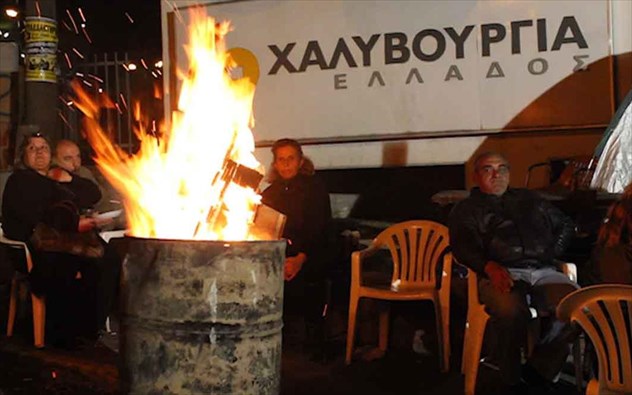Greek Steel Workers Strike - Greece on the verge of revolution? Think again...
Date: Tue, 2012-07-31 16:11
Undoubtedly, Greece is the country that has suffered the most during this last and totally unrestrained wave of liberalization and fierce devaluation of labour which has been sweeping Europe since the start of the financial crisis in 2008. At the same time there are a multitude of political anti-systemic oppositional forces which have managed to maintain a living presence in Greek society.
What this looks like is everything from a widespread network of anarchist/autonomous groups of various flavours, growing in numbers after the 2008 December riots to the network for Inclusive Democracy across to the Greek Communist Party. The Greek Communist Party are one of the few European communist parties not seduced by social-democratic Sirens, still adhering to the communist principles (at least at the rhetorical level) and with a consistent presence in the Parliament. One would be tempted to assume that this situation would turn Greece into a hotbed of revolutionary activity. In fact, there are many, especially among the left-wing intellectuals from abroad, who seem all too willing to make this assumption, thereby creating an image of Greece going through a pre-revolutionary stage.
Of course this is untrue, and it makes no difference to the people who suffer whilst academics dream of revolutions on foreign horizons. What is even more striking though is that none of the above mentioned groups has gathered much attention during this imaginary creation of the “Greek People’s Republic”. Instead, it is SYRIZA (Coalition of the Radical Left) that has been hailed as the possible saviour of Europe, a conglomerate of leftist groups for which the term Left would apply only by a very loose interpretation of the word whereas the term Radical only serves as an marketing trick, showing once again the growing gap between signifiers and significants in this post-modern world of crumbling meanings.
Just before the second round of elections in June, Slavoj Zizek was invited to give a talk at a SYRIZA meeting and as was expected, he charmed his audience by employing all his usual rhetorical devices. When asked about the Communist Party of Greece, he replied that these people are dead but they don’t know it yet. Accusing a pro-Soviet communist party of exhibiting the stiffness of a dead body might of course sound like preaching to the converted. However, doing so among a bunch of social democrats who have failed to sense the stinking odour of the rotting body of Social Democracy sounds like a twisted Monty Python joke.
Back to basics
A few kilometres away from this SYRIZA meeting, in an industrial suburb of the greater area of Athens, about 400 steel workers were into the seventh month of their strike. These are workers who have to work in dangerous conditions such as amongst molten streams of steel which sometimes might find its way on their bodies. If they are lucky, they might get away with some burns. If they are not, they simply die. They were running one of the longest strikes in modern Greek history which mainstream media had carefully chosen not to cover. Needless to say, Slavoj didn’t bother to pay them a visit.
Before the start of the financial crisis, the Greek Steel Industry was considered to be one of the largest Greek industries in terms of sales among those that were not in the stock exchange market. Comprising of two sites, one in Athens and another one in Thessaly, a region about 300 kilometres to the north of Athens, it had a revenue of more than €320 million, employing almost 1000 workers. Its actual production had risen during the past 20 years to about 1 million tons of steel per year and it kept rising at the time that the strike began.
In October 2011 the company announced to the workers that it faced financial difficulties, i.e. a significant reduction of sales since the start of the crisis and presented them with a choice. In order to cut down costs, they would either have to accept a five-hour workday, accompanied by a reduction of their wages by 40% or 180 of them would be fired. In order to see this dilemma in its true perspective, it is worth noting that the monthly wage starts at 900 Euro for a newly hired, inexperienced worker and goes up to no more than 1500 for a worker with decades of experience, working overtime, during weekends and on night-shifts.
Faced with this dilemma, the 400 workers at the Athens site decided to respond in their own way and after a general assembly they voted for a strike which nobody believed would last that long. The atrophied major unions (GSEE for those working in the private sector and ADEDY for those in the public sector) have made a habit of calling for strikes which almost always have a more or less symbolic character, lasting no more than 24 or 48 hours. However, this time the workers assembly showed an unusual determination which of course forced the company management to take the offensive and soon afterwards the first layoffs were announced. 38 people were initially fired, a practice that the managers kept escalating as the workers showed no signs of submission. At the time that this article is being written, this number has risen to 120 fired workers. Besides these sackings, the company has made use of a number of other aggressive tactics, from using strike-breakers to split the workers to arresting the president of their assembly and even bringing the case to court which ruled the strike as illegal. A host of establishment journalists didn't miss the chance to follow suit once again, demanding that the government be firm in enforcing the law and bring things back to normality so that the company's problems could be discussed in a "rational", "responsible" and "civilized" way. At present, the company does not seem willing to step back from its initial decision, even though a number of workers no longer wish to be hired again and the rest of them have suggested to the company that only 40 of them should be hired immediately and the rest can return to their jobs gradually.
A walk among the ruins of the unions
The current stalemate situation deserves a closer look since, in certain respects, it epitomizes all the contradictions that plague the unions, their structure and the means they employ for their struggle (assuming of course that their goal is to fight for the interests of the workers, an assumption not at all self-evident). What has allowed the steel workers to keep their fight going for more than 8 months now is a substantial wave of solidarity and (material and financial) support that they have received from various groups and individuals, even from other countries. On the other hand, the company has managed to survive the strike due to the fact that the workers' representatives at the Thessaly site chose to answer the dilemma posed by the company's management by accepting lower wages and reduced work hours. Anyone can guess the outcome of this struggle, in case there's no further escalation on the part of the workers. The company, considered to be the spearhead of changes in the Industry which attempt to lower labour costs, will probably have the final say.
An important difference between the two sites: in Thessaly, the workers society is led by groups affiliated with the ruling parties in Greece (New Democracy and PASOK) whereas in Athens its president is a member of PAME, a syndicalist organization with links to the Greek Communist Party. Therefore, an obvious explanation for the division among the workers at the two sites is that the ones in Thessaly are represented by corrupt unionists with interests identified more with those of their bosses than those of the workers they are supposed to represent whereas the ones in Athens have managed to attain a pure working class consciousness. Of course that is an oversimplified analysis, the truth is however, much more complex. A few words about the structure of the unions in Greece are necessary at this point. Compared to the charade of the general elections in the so-called states of representative democracy, the situation in the unions, over which the workers should in theory have more control, has come to a level of almost surrealist absurdity. In the last round of elections in Greece, a country with traditionally high percentages of participation in elections, almost 40% of the electorate chose not to vote at all (not including all the immigrants without any electoral rights). According to a study, 52% of the Greek workers say that workers assemblies do not even exist at their workplaces. It is estimated that almost 75% of the workers do not belong to any unions at all. As if this number did not sound scary enough, try adding the hundreds of thousands of unemployed. And then add all the illegally employed. What about the temporarily employed?
On top of this, the overwhelming majority (more than 90% !!) of the members of the executive boards of GSEE and ADEDY work for the public sector whose workers are protected by more safety nets (e.g. until very recently public servants could not be fired). What is more important though is that this striking imbalance reflects the very structure of the Greek state itself (and therefore Greek capitalism) which has been built upon the selective “donation” of benefits among several special interest groups within the public sector resembling in certain respects the tribal divisions in countries of the periphery where capitalism has been forcefully imposed upon heterogeneous populations. Needless to say, this is a poisonous situation that gives rise to fierce conflicts by essentially turning these dependent groups into beggars of the great Father figure of the state and competitors for its benefits.
Another factor that has alienated workers from the unions over the past decades can be traced to their internal organization. As has already been mentioned, the very first division among workers is introduced by the existence of two completely separate high-level organizations, one for the public servants and another one for those working at the private sector. These so-called third-level organizations cover the entire geographical area in Greece and are led by their respective boards whose members are elected among several groups with links to the established political parties, a process not dissimilar to the one for the parliamentary elections. Below them, at the second level, there exist the confederations, divided according to geographical area or type of work and at the base of this hierarchical structure one finds the first-level societies, attached usually to a specific business or company. As is evident, this structure essentially reproduces the same pathological (and pathetic) situation to be found in the centre of the political scene by introducing multiple vertical and horizontal dividing lines of mediation and representation.
The above mentioned communist PAME, established in 1999, has tried to create a separate and parallel structure, condemning the leaders of GSEE and ADEDY as traitors of the working class. At the same time however, it participates in all of their proceedings and elections without ever attempting to completely disengage itself from them whereas being very selective about whom it chooses to support. Closely following the steps of the Greek Communist Party, it keeps its distance from every movement and struggle over which it has failed to gain absolute dominance while being very efficient at containing whatever it leads at very manageable levels.
The net result of all these machinations amounts to nothing more than the appropriation of workers’ power by the professional unionists at the top into leadership positions who have no problem becoming full-time professional politicians after exhausting all the options of climbing up the Union ladder. It’s sad to think that this happened through a slow and gradual process of self-mutilation which a large part of the working class experienced in an almost masochistic daze of perverted pleasure, accompanied by the administration of the “morphine” of loans, mortgages and the dream of someday moving up to a middle-class status, back in the not so distant days of easy money. This works so long as a significant part of those at the bottom of the hierarchy could maintain a lifestyle of reliable (i.e. zombified) consumers by employing the usual exorcism rituals of condemning the union elites as corrupt before going to the next electronics store to buy the latest gadget. Once again, the most vulnerable part of the working class finds itself in a state of paralyzing division and almost complete helplessness. In this perspective, one may have a better understanding of the deadlock situation of the steel workers, a Gordian knot becoming tighter and tighter each time they (or anyone else in position similar to theirs) attempt to pull on the rope.
In search of alternatives
From our point of view, it is obvious that the raison d’être of the unions, as they are today, has ceased to exist. Now that the European capitalist forces attempt to restructure the European economic zone in order to make it more competitive and catch up with the rest of the existing or emerging economic superpowers, they have no intention of making any compromises when it comes to lowering labour costs. For them, within their own political framework, it is a matter of life or death. The time of the welfare state is over and no return to obsolete forms of Keynesianism or Social Democracy is possible. The Unions, as distributors of “benefits” to and pacifiers of the workers, will probably discover, sooner or later, that they have not only become useless for the workers but that the ruling elites as well have no use for them.
It is therefore imperative that new forms of resistance are developed before it is too late (if it isn’t already). Without going into a very thorough analysis, there are certain steps that the workers can take, if they are to have any chance of surviving the onslaught that is about to hit them (what we’ve seen is just foreplay). No matter how hard or unthinkable this might seem, the workers can make their voices be heard and their presence be felt again in a truly antagonistic manner only if they burn the bridges than still link them with the existing unions and start building their own organizations again, irrespective of whether this move might be declared as illegal. Organizations without all these levels of mediation and at the same time less divided which should accommodate not only those with permanent jobs but also the masses of the unemployed or precariously employed. Organizations that should respond not only reactively and defensively, with strikes and negotiations, but also proactively, by building international (if possible, given the international nature of the current “war”) networks of (material) support that should be automatically activated in cases like those of the steel workers who had to depend on the goodwill of their supporters.
Furthermore, if one understands the current situation as we do, i.e. that the time of compromises is over, then the next logical step is to move towards more radical defence tactics and even take the offensive. We may find one such example in Greece again. Since May 2011, the management of the Industrial Mining company in Thessaloniki (about 500 kilometres north of Athens) has stopped paying its employees, again due to financial difficulties. After months of negotiations and unemployment, the general assembly of the workers reached the following decision. The workers should take over the company and start running it on their own by dividing the shares equally among themselves. No wonder the Confederation of Industry Workers was hostile to this action. You guessed right. It is led by representatives affiliated with the ruling parties.
It is no secret that this kind of workers cooperatives may very well turn into fully assimilated capitalist companies if they try to move towards production on a mass scale while struggling to survive in the existing environment. However, we need to start discovering those few threads that can loosen up the Gordian knot while preparing the sword that will cut through it.
UPDATE 1: After this article was written, the few news media that cover the strike of the steel workers have reported that the company’s management is taking all the necessary legal steps to completely shut down the Athens site.
UPDATE 2: In the early morning hours of July 20, the riot police was called in to force the strikers out of the factory so that it can resume its operation. A week after, the workers’ assembly announced that the strike was over. Let’s hope that this was only the beginning and that this strike will wake up from their deep slumber those parts of the oppressed whose dreams have not yet become serene, quiet and peaceful.



















